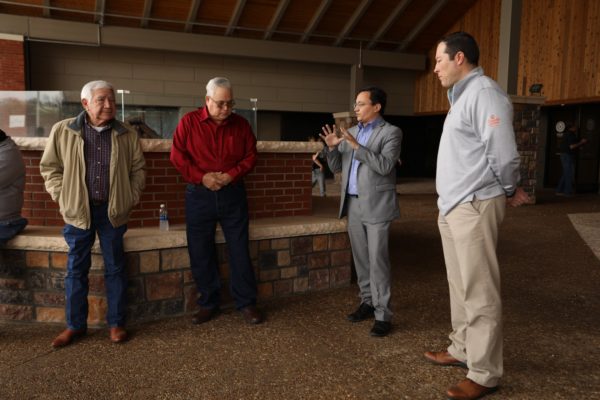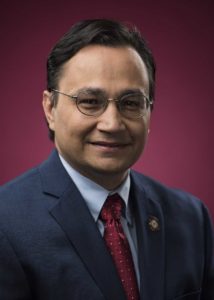
- Details
- By Chuck Hoskin Jr
Guest Opinion
Just a short time ago, I and most Cherokees were focused on the plans and activities of everyday life. We could take so much for granted as we enjoyed community gatherings, spent time with colleagues, friends and family, and moved around our social spaces.
Now, the COVID-19, or coronavirus, outbreak has forced us to set aside normal life for a while. We Cherokees, Oklahomans, Americans and people all over the world are doing our part to take on this dangerous threat.
As Principal Chief of the Cherokee Nation, the largest tribal government in America, I feel a great responsibility to protect our citizens, our workers and our communities in northeast Oklahoma. My administration, Deputy Chief Bryan Warner and the Council of the Cherokee Nation are acting swiftly to put health and safety first.
I recently signed a proclamation declaring a state of emergency within Cherokee Nation, joining with similar declarations by the state and federal government. Emergency measures allow us to maximize our tools for addressing this crisis.
Our courageous team at Cherokee Nation is doing everything possible to maintain essential services and meet the needs of the people, as our health and emergency staff prepare for the worst. Within the Cherokee Nation government and businesses, we have adopted telework principles and asked elders in our workforce to stay home and stay safe.
 Chuck Hoskin, Jr.
Chuck Hoskin, Jr.
The next few weeks are a crucial time to slow down the spread of the virus so that our health care providers are not overwhelmed. Because saving lives is our top priority, all Cherokee Nation casinos have suspended operation through the end of March. During this suspension, no casino employee will lose a paycheck.
One of the most dangerous aspects of COVID-19 is that it may be spread by people who are not experiencing serious symptoms. By avoiding crowds and unnecessary travel, we can all help protect each other. That is why we have restricted travel and postponed community gatherings. We have postponed local meetings and conferences, as well as Cherokee Nation’s at-large gatherings and the planned Cherokee Days in Washington, D.C.
As we increase precautions and implement strategies to reduce the impact of COVID-19, please understand that our first priority is to protect our elders, who are our most vulnerable community members during this time.
The latest medical statistics indicate that those 60 and over are at the greatest risk from COVID-19. As Cherokee people, we are taught to respect our elders. Our elders carry our language, our traditions and our culture, and we will do everything in our power to protect their lives and legacy. Our elders are counting on us to keep them safe, and our Cherokee values make that a very high priority.
The Cherokee people have endured much in our long history. In this latest crisis, we must draw on that experience and resiliency to get through as we always do, with grace and courage.
In this time of great uncertainty, our decisions must be guided by facts and medical science, not rumors and fears. I encourage all of you to do the same as you adjust your day-to-day lives. Please continue to take care of yourselves, your families and our elders. We must all be vigilant to keep our tribal nation strong.
We will monitor the pandemic closely and continually evaluate our next steps. Stay up to date with our efforts to address the impacts of COVID-19 at cherokee.org, on the tribe’s Facebook page or by calling the COVID-19 call center at 833-528-0063.
Chuck Hoskin, Jr. is the principal chief of the Cherokee Nation.
More Stories Like This
Native News Weekly (August 25, 2024): D.C. BriefsUS Presidents in Their Own Words Concerning American Indians
Ethics Complaint Alleges Former Navajo Nation Chief of Staff Accepted Gifts From Contractor
Monday Morning (December 14, 2025): Articles You May Have Missed This Past Weekend
Senators Demand Accountability Amid Reports of ICE Questioning Native Americans
Help us defend tribal sovereignty.
At Native News Online, our mission is rooted in telling the stories that strengthen sovereignty and uplift Indigenous voices — not just at year’s end, but every single day.
Because of your generosity last year, we were able to keep our reporters on the ground in tribal communities, at national gatherings and in the halls of Congress — covering the issues that matter most to Indian Country: sovereignty, culture, education, health and economic opportunity.
That support sustained us through a tough year in 2025. Now, as we look to the year ahead, we need your help right now to ensure warrior journalism remains strong — reporting that defends tribal sovereignty, amplifies Native truth, and holds power accountable.
 The stakes couldn't be higher. Your support keeps Native voices heard, Native stories told and Native sovereignty defended.
The stakes couldn't be higher. Your support keeps Native voices heard, Native stories told and Native sovereignty defended.
Stand with Warrior Journalism today.
Levi Rickert (Potawatomi), Editor & Publisher
